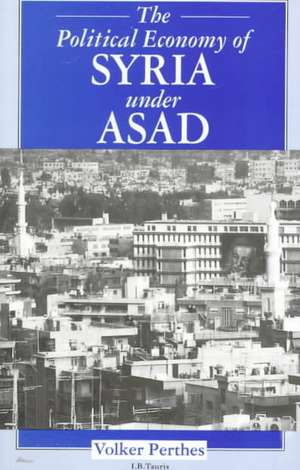The Political Economy of Syria Under Asad
Autor Volker Perthesen Limba Engleză Paperback – 30 dec 1997
Preț: 174.15 lei
Preț vechi: 212.72 lei
-18% Nou
Puncte Express: 261
Preț estimativ în valută:
33.33€ • 36.22$ • 28.02£
33.33€ • 36.22$ • 28.02£
Carte tipărită la comandă
Livrare economică 21 aprilie-05 mai
Preluare comenzi: 021 569.72.76
Specificații
ISBN-13: 9781860641923
ISBN-10: 186064192X
Pagini: 312
Ilustrații: tables, 1 figure, bibliography, index
Dimensiuni: 138 x 216 x 23 mm
Greutate: 0.44 kg
Ediția:Nouă
Editura: Bloomsbury Publishing
Colecția I.B.Tauris
Locul publicării:London, United Kingdom
ISBN-10: 186064192X
Pagini: 312
Ilustrații: tables, 1 figure, bibliography, index
Dimensiuni: 138 x 216 x 23 mm
Greutate: 0.44 kg
Ediția:Nouă
Editura: Bloomsbury Publishing
Colecția I.B.Tauris
Locul publicării:London, United Kingdom
Cuprins
Part 1 Introduction: historical developments and literature on contemporary Syria; research interests and basic assumptions; sources and data; plan of study. Part 2 The emergence and transformation of a statist economy: macro-economic variables and imbalances; development approaches and public-sector economy; state and private economy - patterns and phases of liberalization; conclusion - prospects and limits of economic change. Part 3 Social structure and class relations: rural relations; urban society; conclusion - social structures and political alliances. Part 4 The structure of authoritarianism: institution-building and political development - an overview; the institutional framework; representation and control - front parties, the legislative and popular organizations; conclusion - patrimonialism, authoritarianism rule and the strong state. Part 5 Economic policies and political decision-making: the absence of external interference; the institutional and procedural framework; the style of economic-policy formation; conclusion - economic reform and patterns of incorporation. Part 6 Conclusion - authoritarian adjustment and the prospects of political development: adjustment and control; economic liberalization and political change; domestic control and regional role; Asad - and after?.
